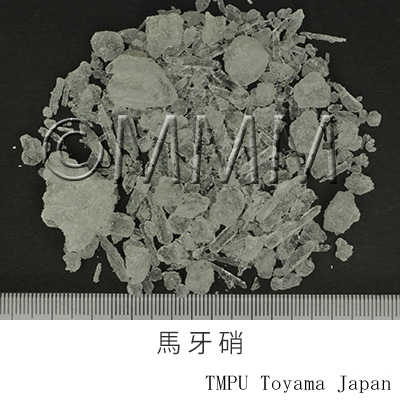※Click on the image to enlarge it.
Crude drug name

| Market name | 馬牙硝 |
|---|
| Formal name | 芒硝 |
|---|
| Japanese name | ぼうしょう, Bōshō |
|---|
| Vernacular name | Mangxiao |
|---|
| Latin name | Sal Mirabilis (JP), Natrii Sulfas (CP) |
|---|
| English name | Sodium Sulfate Decahydrate (JP), Sodium Sulfate (CP) |
|---|
| Original plant name | (mainly sodium sulfate (Na2SO4) containing no water of crystallization) |
|---|
| Used part | Classification | Mineral origin |
|---|
Sub classification | mineral | | Production area information | People's Republic of China, Sichuan Prov. |
|---|
| Collection information | Japan, Osaka Pref. , Tochimoto Tenkaido Co., Ltd. , Tochimoto Tenkaido Co., Ltd. |
|---|
| Collection date | 2020/10/09 |
|---|
| Collector | Katsuko Komatsu |
|---|
| Remarks | Joint Usage / Research Center Project 2020 |
|---|
| TMPW No. | 30708 |
|---|
Production area information
People's Republic of China,Sichuan Prov.
| Common name | 芒硝, Mangxiao, Sal Mirabilis (JP18), Natrii Sulfas (CP2020), Sodium Sulfate Hydrate (JP18), Sodium Sulfate (CP2020) |
|---|
| crude drug image |  |  |
※Click on the image to enlarge it. |
|
|---|
| Original plant name | 主として結晶水を含まない硫酸ナトリウム(Na2SO4)/ mainly sodium sulfate (Na2SO4) containing no water of crystallization, Sodium Sulfate Hydrate |
|---|
| Used part | mineral |
|---|
| Official compendium | JP XVIII, CP (2020 ed.) |
|---|
| Clinical application | As a mild laxative, digestive and diuretic, mangxiao is applied for abdominal mass with excess syndrome of yang in the interior, retention of undigested food, abdominal distention, feeling of precordial and abdominal resistance. It is generally blended with dahuang. |
|---|
| Medical system | Traditional Chinese medicine |
|---|
Drug effect in
traditional medicine | Traditional
classification | Purgatives |
|---|
| Beneficial effect | [Property and Flavor] Cold; salty and bitter.
[Meridian Tropism] Stomach and large intestine meridians.
[Actions] To purge to relax the bowels, moisten dryness and soften hardness, clear fire and disperse swelling.
[Indications] Accumulation and stagnation of excess heat distention, pain and fullness in the abdomen, dry stool binds, intestinal abscess with swelling and pain; Topical application: acute mastitis, painful swelling hemorrhoids. |
|---|
| Chemical constituent | Others
(*C1):
Na2SO4(96~98%).微量の NaCl, MgCl2, MgSO4, CaSO4 などを含む.
It contains a tiny amount of NaCl, MgCl2, MgSO4, CaSO4, etc.
|
|---|
| Pharmacological effect | Intestinal hyperperistalsis. |
|---|
Classical reference
(Chinese Herbal Classic "Zhenglei bencao") |  ※Click this image to see the actual image ※Click this image to see the actual image |
|---|
| Disease | Full stomach, Abdominal pain, Constipation, High fever, Disturbance of consciousness, Lower abdominal pain, Throat ulcer, Stomatitis, Red eye, Eye pain |
|---|
| Formulation | Daiobotampito, Choijokito, Tsudosan, Tokakujokito, Bofutsushosan, Saikosokanto, Daijokito, Mokuboikyosekkokabukuryoboshoto, Toryuto, Saikokaboshoto |
|---|
| Related drugs | Sodium sulfate (see "Remarks") |
|---|
| References | JP18: The 18th edition of the Japanese Pharmacopoeia.
CP2020: Pharmacopoeia of the People's Republic of China 2020 edi.
C1) The Encyclopedia of Wakan-Yaku with Color Pictures Vol. II, pp 360-362. |
|---|
| Remarks | The ancient Mangxiao (芒硝) was the magnesium sulfate crystal, MgSO4・7H2O. It was also called Bagashō (馬牙消), Eishō (英消), Shōseki (消石), etc. Though sodium sulfate is the original mineral of Mangxiao according to the Japanese Pharmacopoeia at present, it should be the original mineral of Bokushō (朴消). Mangxiao stored in the Shosoin Storehouse is magnesium sulfate crystal. |
|---|
| Last renewal date | 2021/09/28 |
|---|
| | |
|---|





